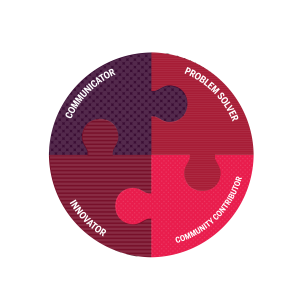23 Setting Your Internship Goals
Setting goals helps you grow!
What do you want to learn this year? By the end of the internship, how do you want to have grown?
Writing your own learning goals will help you stay on track to reach them and will help your supervisor understand how you want to grow as a professional this year. We will start coming up with goals at orientation and then continue the process of goal-setting by collaborating with your supervisor to complete the “Writing your internship goals” assignment that will open at orientation.
You have already started to think about your goals! You can refer back to:
- Your internship application. The short answer questions can help you think back on why you’re doing LHSI.
- The self-assessment you did as part of the orientation pre-work module. You rated your confidence in various skills and there was a question about the skills you’d like to use or what you’d like to learn this year. Select a skill or two where you rated yourself lower and turn that into a goal.
IU Indianapolis Profiles

Keep in mind the IU Indianapolis Profiles of Learning for Undergraduate Success (Profiles) as you write your goals. How might you show that you are a Communicator, Problem Solver, Innovator, or Community Contributor? More information on the Profiles can be found at IUI Profiles
Communicator
The communicator conveys ideas effectively and ethically in oral, written, and visual forms across public, private, interpersonal, and team settings, using face- to-face and mediated channels. Communicators are mindful of themselves and others, listen, observe, and read thoughtfully, ask questions, evaluate information critically, create messages that demonstrate awareness of diverse audiences, and collaborate with others and across cultures to build relationships.
- evaluates information
- listens actively
- builds relationships
- conveys ideas effectively
Problem Solver
The problem solver works individually and with others to collect, analyze, evaluate, and synthesize information to implement innovative solutions to challenging local and global problems.
- thinks critically
- collaborates
- analyzes, synthesizes, and evaluates
- perseveres
Innovator
The innovator builds on experiences and disciplinary expertise to approach new situations and circumstances in original ways, is willing to take risks with ideas, and pose solutions. Innovators are original in their thoughts and ask others to view a situation or practice in a new way. Innovators are good decision makers, can create a plan to achieve their goals, and can carry out that plan to its completion. Innovators use their knowledge and skills to address complex problems in order to make a difference in the civic life of communities, and to address the world’s most pressing and enduring issues.
- investigates
- creates/designs
- confronts challenges
- makes decisions
Community Contributor
The community contributor is an active and valued contributor on the campus and in communities locally and globally. They are personally responsible, self-aware, civically engaged and they look outward to understand the needs of the society and their environment. They are socially responsible, ethically oriented, and actively engaged in the work of building strong and inclusive communities, both local and global.
- builds community
- respectfully engages own and other cultures
- behaves ethically
- anticipates consequences
NACE Career Competencies
National Association of Colleges and Employers has identified competencies for career-readiness. The Career Competency definitions below are from naceweb.org/career-readiness-competencies.
Career & Self Development
Proactively develop oneself and one’s career through continual personal and professional learning, awareness of one’s strengths and weaknesses, navigation of career opportunities, and networking to build relationships within and without one’s organization.
Communication
Clearly and effectively exchange information, ideas, facts, and perspectives with persons inside and outside of an organization.
Critical Thinking
Identify and respond to needs based upon an understanding of situational context and logical analysis of relevant information.
Equity & Inclusion
Demonstrate the awareness, attitude, knowledge, and skills required to equitably engage and include people from different cultures and backgrounds. Engage in anti-oppressive practices that actively challenge the systems, structures, and policies of racism and inequity.
Leadership
Recognize and capitalize on personal and team strengths to achieve organizational goals.
Professionalism
Knowing work environments differ greatly, understand and demonstrate effective work habits, and act in the interest of the larger community and workplace.
Teamwork
Build and maintain collaborative relationships to work effectively toward common goals, while appreciating diverse viewpoints and shared responsibilities.
Technology
Understand and leverage technologies ethically to enhance efficiencies, complete tasks, and accomplish goals.

